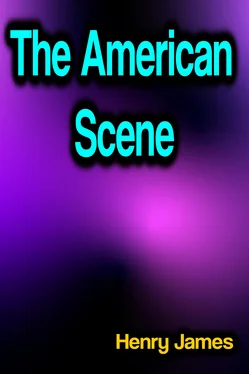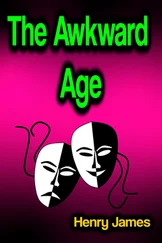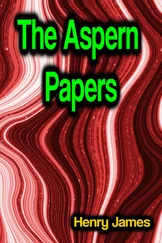Henry James - The American Scene
Здесь есть возможность читать онлайн «Henry James - The American Scene» — ознакомительный отрывок электронной книги совершенно бесплатно, а после прочтения отрывка купить полную версию. В некоторых случаях можно слушать аудио, скачать через торрент в формате fb2 и присутствует краткое содержание. Жанр: unrecognised, на английском языке. Описание произведения, (предисловие) а так же отзывы посетителей доступны на портале библиотеки ЛибКат.
- Название:The American Scene
- Автор:
- Жанр:
- Год:неизвестен
- ISBN:нет данных
- Рейтинг книги:3 / 5. Голосов: 1
-
Избранное:Добавить в избранное
- Отзывы:
-
Ваша оценка:
- 60
- 1
- 2
- 3
- 4
- 5
The American Scene: краткое содержание, описание и аннотация
Предлагаем к чтению аннотацию, описание, краткое содержание или предисловие (зависит от того, что написал сам автор книги «The American Scene»). Если вы не нашли необходимую информацию о книге — напишите в комментариях, мы постараемся отыскать её.
The American Scene — читать онлайн ознакомительный отрывок
Ниже представлен текст книги, разбитый по страницам. Система сохранения места последней прочитанной страницы, позволяет с удобством читать онлайн бесплатно книгу «The American Scene», без необходимости каждый раз заново искать на чём Вы остановились. Поставьте закладку, и сможете в любой момент перейти на страницу, на которой закончили чтение.
Интервал:
Закладка:
This vision, for the moment, of a great dim, clustered but restlessly expansive Harvard, hushed to vacation stillness as to a deep ambitious dream, was, for the impressible story-seeker, practically the germ of the most engaging of the generalized images of reassurance, the furniture, so to speak, of the other scale, that the extension of his view was to cause him to cultivate. Reassurance is required, before the spectacle of American manners at large, whenever one most acutely perceives how little honour they tend to heap on the art of discrimination, and it is at such hours that, turning in his frequent stupefaction, the restless analyst reaches out for support to the nearest faint ghost of a constituted Faculty. It takes no exceptional exposure to the promiscuous life to show almost any institution pretending to university form as stamped here with the character and function of the life-saving monasteries of the dark ages. They glow, the humblest of them, to the imagination—the imagination that fixes the surrounding scene as a huge Rappacini-garden, rank with each variety of the poison-plant of the money-passion—they glow with all the vividness of the defined alternative, the possible antidote, and seem to call on us to blow upon the flame till it is made inextinguishable. So little time had it taken, at any rate, to suggest to me that a new and higher price, in American conditions, is attaching to the cloister, literally—the place inaccessible (to put it most pertinently) to the shout of the newspaper, the place to perambulate, the place to think, apart from the crowd. Doubtless indeed I was not all aware of it at the time, but the image I touch upon in connection with those first moments was to remain with me, the figure of the rich old Harvard organism brooding, exactly, through the long vacation, brooding through the summer night, on discriminations, on insistences, on sublime and exquisite heresies to come.
After that arrived daylight recognitions, but they were really for the most part offered me, as in a full cup, by the accident of a couple of hours that were to leave me the pure essence, the finer sense of them. These were a matter of a fortnight later, as I had had immediately to make an absence, and the waning September afternoon of the second occasion took on a particular quality for this deferred surrender of a dozen stored secrets. "Secrets" I call them because the total impression was of the production of some handful of odds and ends that had lurked, for long, in a locked drawer, and which, being brought out, might promote, by their blinking consciousness, either derision or respect. They excited, as befell, an extraordinary tenderness—on which conclusion it was fortunate to be able afterwards to rest. I wandered, for the day's end, with a young modern for whom the past had not been and who was admirably unconscious of the haunting moral of the whole mutation—the tune to which the pampered present made the other time look comparatively grim. Each item of the pampered state contributed to this effect—the finer mise en scene, the multiplied resources, halls, faculties, museums, undergraduate and postgraduate habitations (these last of so large a luxury); the pompous little club-houses, visited, all vacant, in the serious tell-tale twilight that seemed to give them, intellectually, "away"; the beautiful new Union, with its great grave noble hall, of which there would be so much more to be said; and above all, doubtless, the later majesties of the Law School, in the near presence of which the tiny old disinherited seat of that subject, outfaced and bedimmed, seemed unable to make even a futile plea for quaintness. I went into the new Law Library, immense and supreme—in the shadow of which I caught myself sniffing the very dust, prehistoric but still pungent, of the old. I saw in the distance a distinguished friend, all alone, belatedly working there, but to go to him I should have had to cross the bridge that spans the gulf of time, and, with a suspicion of weak places, I was nervous about its bearing me.
What such delicacies came to, then and afterwards, for the whole impression, was the instinct not to press, not to push on, till forced, through any half-open door of the real. The real was there, certainly enough, outside and all round, but there was standing-ground, more immediately, for a brief idyll, and one would walk in the idyll, if only from hour to hour, while one could. This could but mean that one would cultivate the idyllic, for the social, for the pictorial illusion, by every invoking and caressing art; and in fact, as a consequence, the reflection of our observer's experience for the next few weeks—that is so long as the spell of the autumn lasted—would be but the history of his more or less ingenious arts. With the breaking of the autumn, later on, everything broke, everything went—everything was transposed at least into another key. But for the time so much had been gained—the happy trick had been played.
Chapter
8
It was after all in the great hall of the Union perhaps (to come back to that delicate day's end) that the actual vibration of response seemed most to turn to audible music—repeated, with all its suggestiveness, on another occasion or two. For the case was unmistakably that just there, more than anywhere, by a magnificent stroke, an inspiration working perhaps even beyond its consciousness, the right provision had been made for the remembering mind. The place was addressed in truth so largely to an enjoying and producing future that it might seem to frown on mere commemoration, on the backward vision; and yet, at the moment I speak of, its very finest meaning might have been that of a liberal monument to those who had come and gone, to the company of the lurking ghosts. The air there was full of them, and this was its service, that it cared for them all, and so eased off the intensity of their appeal. And yet it appeared to play that part for a reason more interesting than reducible to words—a reason that mainly came out for me while, in the admirable hall aforesaid, I stood before Sargent's high portrait of Major Henry Lee Higginson, donatorio of the house (as well as author, all round about, of innumerable other civil gifts); a representation of life and character, a projection of genius, which even that great painter has never outdone. Innumerable, ever, are the functions performed and the blessings wrought by the supreme work of art, but I know of no case in which it has been so given to such a work to make the human statement with a great effect, to interfuse a group of public acts with the personality, with the characteristics, of the actor. The acts would still have had all their value if the portrait had had less, but they would not assuredly have been able to become so interesting, would not have grown to affect each beneficiary, however obscure, as proceeding, for him, from a possible relation, a possible intimacy. It is to the question of intimacy with somebody or other that all great practical public recognition is finally carried back—but carried only by the magic carpet, when the magic carpet happens to be there. Mr. Sargent's portrait of Henry Higginson is exactly the magic carpet.
That was the "pull" (one kept on feeling) that this happy commemorative creation of the Union had over the great official, the great bristling brick Valhalla of the early "seventies," that house of honour and of hospitality which, under the name of the Alumni Hall, dispenses (apart from its containing a noble auditorium) laurels to the dead and dinners to the living. The recording tablets of the members of the University sacrificed, on the Northern side, in the Civil War, are too impressive not to retain here always their collective beauty; but the monumental office and character suffer throughout from the too scant presence of the massive and the mature. The great structure spreads and soars with the best will in the world, but succeeds in resembling rather some high-masted ship at sea, in slightly prosaic equilibrium, than a thing of builded foundations and embrasured walls. To which it is impossible not immediately to add that these distinctions are relative and these comparisons almost odious, in face of the recent generations, gathered in from beneath emptier skies, who must have found in the big building as it stands an admonition and an ideal. So much the better for the big building, assuredly, and none so calculably the worse for the generations themselves. The reflection follows close moreover that, tactfully speaking, criticism has no close concern with Alumni Hall; it is as if that grim visitor found the approaches closed to him—had to enter, to the loss of all his identity, some relaxing air of mere sentimental, mere shameless association. He turns his back, a trifle ruefully whistling, and wanders wide; so at least I seemed to see him do, all September, all October, and hereabouts in particular: I felt him resignedly reduced, for the time, to looking over, to looking through, the fence—all the more that at Cambridge there was at last something in the nature of a fence so to be dealt with.
Читать дальшеИнтервал:
Закладка:
Похожие книги на «The American Scene»
Представляем Вашему вниманию похожие книги на «The American Scene» списком для выбора. Мы отобрали схожую по названию и смыслу литературу в надежде предоставить читателям больше вариантов отыскать новые, интересные, ещё непрочитанные произведения.
Обсуждение, отзывы о книге «The American Scene» и просто собственные мнения читателей. Оставьте ваши комментарии, напишите, что Вы думаете о произведении, его смысле или главных героях. Укажите что конкретно понравилось, а что нет, и почему Вы так считаете.












